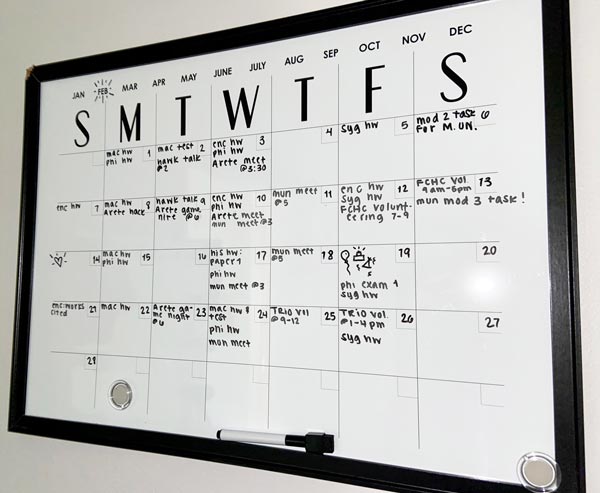How to Maintain Success in School from Home, During a Pandemic

By Brianna Rivera-Lopez
Being a college student and having a sense of freedom within your classes is a great feeling; however, when it comes to trying to maintain good grades and juggling your course load, it can prove to be a stressful challenge. When a pandemic is added to the equation, it can be discouraging to want to stay determined. I am here to tell you the best ways to succeed in school, from home, during a pandemic.
Create a schedule
One of the best things you can do for yourself is to create a schedule. Whether online or in-person, school or work, a schedule is one of the beneficial tools for time-management and organization. A schedule can be a calendar, or planner, which allows you to set up upcoming dates of importance. With a schedule, you can write out any assignment due date, test date, and even class date. By laying out what is due, you give yourself a visual of how long you have to do what you need to. Say there was a test on the 10th of March — by having written that down on your schedule, you were able to work out how long you had to study and make sure that you were present for the test day. If you receive a syllabus on one of your first days of class, I found it best to take some time out of your day so that you can make a note of every due date of every assignment for the semester. By doing this, you allow yourself to be prepared and ready for class. I like to make use of the technology and paper-based resources available to create and keep my schedules.

I like to keep a monthly calendar hung up, right above my workspace, so that I can see what needs to get done by a certain date. Staying ahead of the game is what I have found works best for me, and a monthly calendar allows me to do so. I also keep a couple of planners that are daily based, with hourly time stamps. These planners have assisted me with keeping track of the more meticulous details. For example, if I have an essay that is due by noon on the upcoming Thursday, I can recognize that submission period and make sure that my assignment is turned in by the hour it is due. Not to mention, planners also serve well for your daily tasks outside of school, like appointments and errands. If you are not a fan of carrying around the extra notebooks, there are plenty of apps that make it easy to be equipped with a working schedule. Two apps that I am personally fond of are MyStudyLife and my phone’s built-in calendar app.
Create an organized system
A second method that can help you conquer your college workload is creating an organized system. As an independent person, an organized system is something necessary, whether for school, or work, or personal life. A sense of organization is what may keep your life from being scrambled and messy. The keyword here is “organized.” To be organized is an essential soft skill that can be acquired quickly and that is helpful for a lifetime. An example of a system that is commonly used and found to be effective is a binder. A simple three-ring binder can help you manage your schoolwork — classwork and homework, in addition to any other school-related papers. It can be organized to your liking, whether it is sectioned daily, by class, or by semester. A binder is like a one-stop-shop for all your files. You can even keep extra paper and pens in it so that you are always prepared. I like to keep mine sectioned by course and days of the week; my Monday classes stay sectioned and filed, depending on the time of day that each class occurs. Of course, this system is what I think is most suited for me, and to each their own. Some people are huge fans of color-coordination, and others are not. Being organized is not a linear system, and customizing it is what it is all about; you need to organize a system that fits your needs and is manageable/ maneuverable.
Class participation
Although having a sense of organization and time-management are key elements for success, being able to socialize and emerge yourself into a communicative setting. To put it in blatant terms, you need to participate in class. Even though we are currently in a pandemic, and many courses are still proceeding online, professors are still expecting a class full of active and engaged students. One of the “rules” that I live by is that, as a student, you want to make sure that you say at least one thing every class. It doesn’t matter if you feel as though your question or comment is infantile or a little off topic. A professor wants a student’s participation, regardless of what others may think. They want to know that you have been actively listening and engaged in their lecturing. Three things that one should always have on deck are: a question, a connection, or a comment on what you have learned. These three things are what my philosophy professor has directed my class to adhere to, and it has kept me intuned all semester. Your participation is what allows you to be recognized by your professor(s) and also keeps you attentive.
At the end of the day, you should be using college as a time to discover what works for you and helps you succeed; but the three most important concepts to grasp and manage are time management, organization, and participation.

Brianna Rivera-Lopez is a first-generation student from Puerto Rico pursuing a degree in political science at Hillsborough Community College, and soon, Boston University.

























